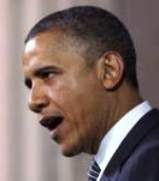WASHINGTON -- A critical document from President Barack Obama's free trade negotiations with eight Pacific nations was leaked online early Wednesday morning, revealing that the administration intends to bestow radical new political powers upon multinational corporations, contradicting prior promises.

Liar and servant to the Elites
The leaked document has been posted on the website of Public Citizen, a long-time critic of the administration's trade objectives. The new leak follows substantial controversy surrounding the secrecy of the talks, in which some members of Congress have complained they are not being given the same access to trade documents that corporate officials receive.
"The outrageous stuff in this leaked text may well be why U.S. trade officials have been so extremely secretive about these past two years of [trade] negotiations," said Lori Wallach, director of Public Citizen's Global Trade Watch in a written statement.
Sen. Ron Wyden (D-Ore.) has been so incensed by the lack of access as to introduce legislation requiring further disclosure. House Oversight Committee Chairman Darrell Issa (R-Calif.) has gone so far as to leak a separate document from the talks on his website. Other Senators are considering writing a letter to Ron Kirk, the top trade negotiator under Obama, demanding more disclosure.
The newly leaked document is one of the most controversial of the Trans-Pacific Partnership trade pact. It addresses a broad sweep of regulations governing international investment and reveals the Obama administration's advocacy for policies that environmental activists, financial reform advocates and labor unions have long rejected for eroding key protections currently in domestic laws.
Under the agreement currently being advocated by the Obama administration, American corporations would continue to be subject to domestic laws and regulations on the environment, banking and other issues. But foreign corporations operating within the U.S. would be permitted to appeal key American legal or regulatory rulings to an international tribunal. That international tribunal would be granted the power to overrule American law and impose trade sanctions on the United States for failing to abide by its rulings.
The terms run contrary to campaign promises issued by Obama and the Democratic Party during the 2008 campaign.
"We will not negotiate bilateral trade agreements that stop the government from protecting the environment, food safety, or the health of its citizens; give greater rights to foreign investors than to U.S. investors; require the privatization of our vital public services; or prevent developing country governments from adopting humanitarian licensing policies to improve access to life-saving medications," reads the campaign document.
Yet nearly all of those vows are violated by the leaked Trans-Pacific document. The one that is not contravened in the present document -- regarding access to life-saving medication -- is in conflict with a previously leaked document on intellectual property (IP) standards.
"Bush was better than Obama on this," said Judit Rius, U.S. manager of Doctors Without Borders Access to Medicines Campaign, referring to the medication rules. "It's pathetic, but it is what it is. The world's upside-down."
In a statement provided to HuffPost, the Office of the U.S. Trade Representative downplayed the concerns.
"This administration is committed to ensuring strong environmental, public health and safety laws," said USTR spokesperson Nkenge Harmon. "Nothing in our TPP investment proposal could impair our government's ability to pursue legitimate, non-discriminatory public interest regulation, including measures to protect public health, public safety and the environment."
Words like "legitimate" and "nondiscriminatory" can have flexible interpretations among international tribunals, however, which have recently ruled that U.S. dolphin-safe tuna labelling and anti-teen smoking efforts are unfair barriers to trade, according to prior trade pacts. The new investment rules, for instance, extend to government contracting negotiations, eliminating so-called "Buy American" preferences for domestic manufacturers.
USTR has previously stated that it does not comment on the terms of an allegedly leaked document.
The Office of the U.S. Trade Representative insists that while broad standards require many medical patents and IP rules that would increase the price of medications, the U.S. intends to work with countries involved in the Trans-Pacific talks to ensure that the agreement does not restrict access to life-saving drugs.
That statement is belied somewhat by recent American efforts in other international negotiations to establish controversial medical patents that grant companies long-term monopolies on life-saving medications. Those monopolies increase drug prices, which impede access to medications, particularly in developing nations. The World Health Organization and dozens of nonprofit public health groups have objected to the standards sought by the Obama administration. Two United Nations groups recently urged global governments not to agree to trade terms currently being advocated by the Obama administration, on the grounds that such rules would hurt public health.
Such foreign investment standards have also come under fire at home, from both conservative sovereignty purists and progressive activists for the potential to hamper domestic priorities implemented by democratically elected leaders. The North American Free Trade Agreement, passed by Congress in 1993, and a host of subsequent trade pacts granted corporations new powers that had previously been reserved for sovereign nations and that have allowed companies to sue nations directly over issues.
While the current trade deal could pose a challenge to American sovereignty, large corporations headquartered in the U.S. could potentially benefit from it by using the same terms to oppose the laws of foreign governments. If one of the eight Pacific nations involved in the talks passes a new rule to which an American firm objects, that U.S. company could take the country to court directly in international tribunals.
Public Citizen challenged the independence of these international tribunals, noting that "The tribunals would be staffed by private sector lawyers that rotate between acting as 'judges' and as advocates for the investors suing the governments," according to the text of the agreement.
In early June, a tribunal at the World Bank agreed to hear a case involving similar foreign investment standards, in which El Salvador banned cyanide-based gold mining on the basis of objections from the Catholic Church and environmental activists. If the World Bank rules against El Salvador, it could overturn the nation's domestic laws at the behest of a foreign corporation.
Speaking to the environmental concerns raised by the leaked document, Margrete Strand Rangnes, Labor and Trade Director for the Sierra Club, an environmental group said, "Our worst fears about the investment chapter have been confirmed by this leaked text ... This investment chapter would severely undermine attempts to strengthen environmental law and policy."
Basic public health and land-use rules would be subject to challenge before an international tribunal, as would bank regulations at capital levels that might be used to stymie bank runs or financial crises. The IMF has advocated the use of such capital controls, which would be prohibited under the current version of the leaked trade pact. Although several countries have proposed exceptions that would allow them to regulate speculative financial bets, the U.S. has resisted those proposals, according to Public Citizen.
Trans-Pacific negotiations have been taking place throughout the Obama presidency. The deal is strongly supported by the U.S. Chamber of Commerce, the top lobbying group for American corporations. Obama's Republican opponent in the 2012 presidential elections, Mitt Romney, has urged the U.S. to finalize the deal as soon as possible.
© 2012 TheHuffingtonPost.com, Inc
http://tinyurl.com/7k4xtzw
